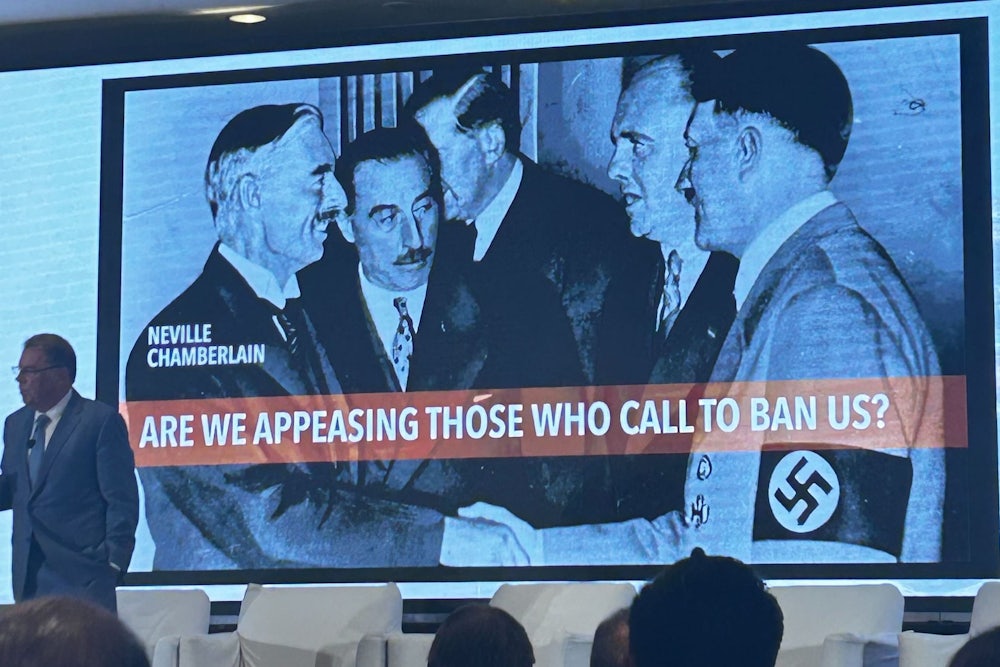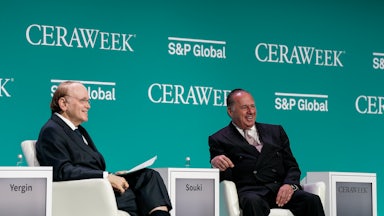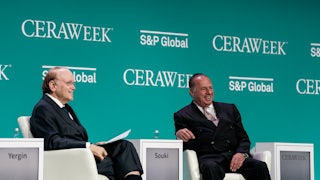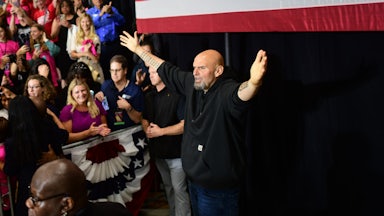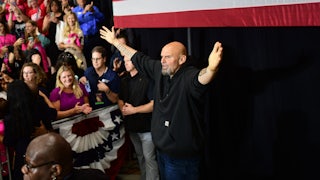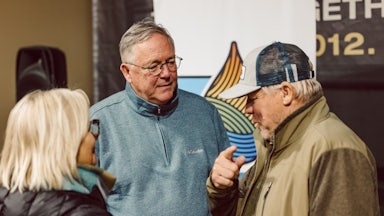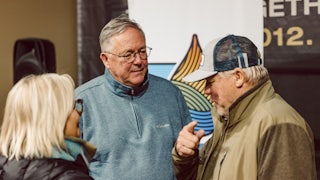At an end-of-day keynote at the North American Gas Forum—an annual confab for fossil fuel executives, sponsored by a who’s who of fossil fuel companies, including Shell, BP, Tellurian, and Baker Hughes—keynote speaker and Davies Public Affairs CEO John Davies made a curious comparison.
The presentation (“A Defining Moment for Natural Gas: What Are We Going to Do About It?”) was mainly about building public support for methane gas. “We’re being attacked on a daily basis,” he began, pacing around the stage in a gray suit.
You might reasonably expect Adolf Hitler would not come up in such a presentation. You would be wrong. If gas producers don’t counter negative messaging about fossil fuels, Davies warned, they will be no better than Neville Chamberlain, the British prime minister who infamously pursued the so-called “appeasement” policy toward the Nazi regime that would go on to murder approximately six million Jews, hundreds of thousands of disabled people, Roma, and others, and millions of Soviet, Polish, and Serbian civilians.
As the slide behind him—complete with a picture of Chamberlain shaking hands with Hitler, swastika prominently displayed—asked, “Are we appeasing those who call to ban us?”
“We don’t talk about how they’re wrong. We don’t talk about why,” Davies said, referring to critics of the gas industry. “The craziest thing is we just don’t talk at all. We just don’t talk about it. We don’t reach out. We don’t do anything.” Davies added that “the very people that want to ban natural gas, that want to end the industry are going to get mad at us if we talk about the positive attributes.” He suggested that rather than “fighting back,” the industry “tell our positive story, which is so well accepted. So we don’t become Neville Chamberlain. That is not a great place to be.”
A request for comment on the Hitler comparison, directed to Davies’s firm, went unanswered until a day after publication of this story, when he sent this statement: “This point made in the choice of slide image was in poor judgement and should not have been used. I am appreciative for the feedback I have received and would like to wholeheartedly apologize to the Jewish community and to those present for the unnecessary reference. It will no longer be used and I am regretful that it was ever used in the first place.”*
Davies’s presentation at the North American Gas Forum in Washington, D.C., came five days after The New York Times reported research showing that gas hookups, including stoves, may be poisoning people in their homes. The research suggested that gas hookups may be significantly increasing indoor levels of benzene, which accumulates in human bodies and is known to increase the risk of cancer.
Davies’s clients are not publicly listed on his firm’s website, but the company’s highlighted work includes a project for Texas LNG. Davies’s work with gas and renewables clients is prominently featured. “You may be facing loud mobilized opposition to your plans, as well as hostile elected officials,” the website states. “We overcome these opposing forces by identifying and activating a motivated and educated crowd in favor of your plans, redefining the issue and moving public opinion.”
His website boasts that his firm became “one of the nation’s top twenty-five public relations firms by applying precise implementation of innovative strategies, compelling messages, and flawless execution to change public perception.”
After comparing those opposed to fossil fuel development to history’s most infamous genocidaire, Davies went on to share polling results of public perceptions of fossil fuels and tell an extended anecdote about latrines falling out of use in the developing world, reaching a vague conclusion about the need to find solutions. A few minutes later, his computer abruptly shut down and the screen went black. After a back-and-forth with event staff, Davies asked the crowd whether anyone had a good joke while the computer started back up. No one did.
Once the presentation was back up, he proceeded, ending on an inspirational note: “This is your moment to be bold.”
* This article has been updated with Davies’s statement.
